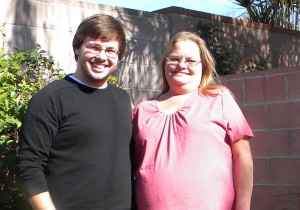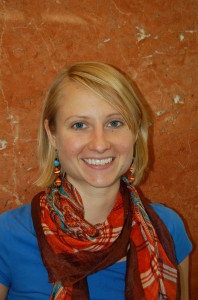By Sarah Dreier, Legislative Representative of International Policy for the ELCA and The Episcopal Church
Maria spoke very little English, and I speak no Korean. But the wisdom that shone in Maria’s eye instantly inspired my trust. So I climbed into her van, along with two of her employees (sex industry survivors) and her young son, and the five of us drove into the heart of one of Seoul’s red light districts.
“Stay alert — we will need to run if the men catch us!” Maria conveyed to me in broken English.
As I stepped timidly out of the van (which Maria had parked in a narrow alleyway), I watched Maria scamper from one window to another, each of which displayed a young woman. She handed each prostitute a hair barrette with the phone number for Maria’s women’s shelter hidden inside. Maria and her phone are inseparable; she knows that she may only have one chance to connect with the sex workers who call her, eager to escape the indentured servitude of the red light district.
The next day, Maria welcomed me into her home. It was a safe haven she shared with those she has rescued from the sex industry, and with the newborn baby who had been abandoned by his mother. (Like many women and girls, this little baby’s mother had been broken by the confluence of forced drug addiction, physical abuse, and emotional degradation; she disappeared shortly after her son was born.)
Maria and I sat in a quiet little room and prayed together. We held hands and meditated in silence, even as the sounds of a crying baby and a busy house swirled around us. Maria looked profoundly content and grateful.
And I thought of another Mary, the mother of Jesus, amid the hustle and commotion of Jesus’ birth: “But Mary treasured all these words and pondered them in her heart” (Luke 2:19). Like Mary, Maria is a nurturer, dedicated to caring for the women and girls who have suffered the tortures of gender-based violence and abuse.
I’ve met many other nurturers in my travels: the sisters of a Lutheran friend and colleague who generously welcomed me into their crowded Nairobi home; the women of the Episcopal Church of Cuba who cared for me when I fell ill; the former Sudanese refugee — herself expecting a child — who shared her own challenging refugee story with me and with members of Congress in hopes that we may protect those who remain in conflict zones. These generous women have nurtured me, a stranger, and it saddens me that our world does not afford them the same courtesy of safety and support.
Gender-based violence is a pernicious global phenomenon that takes many forms, including domestic violence, rape and sexual assault, forced prostitution and sex slavery, female genital mutilation, forced child marriages, assault on the basis of sexual orientation, dowry crimes and honor killings, infanticide, and gender discrimination. An estimated one in five women experiences rape or attempted rape and up to 70 percent of all women will experience gender-based violence from men in their lifetime (for more information, click here). Women in developing countries experience particularly high levels of violence, where cycles of poverty, hunger and insecurity make them more vulnerable to violent assault and abuse.
Next week, world leaders will convene in New York City for the 57th Annual United Nations Commission on the Status of Women. This year, they will focus on eliminating and preventing all forms of gender-based violence. Activists will call on world governments to commit to ending violence against women and girls through translating international promises into concrete national action, and by strengthening norms that combat violence.
“We all must do better to protect women and prevent this pervasive human rights violation,” says Michelle Bachelet, executive director of UN Women, announced in preparation for next week’s gathering.
This year during the United Nations Commission on the Status of Women, I will remember the women Maria has saved and supported, and how their lives have been affected by gender-based violence. The Commission on the Status of Women can serve as a reminder that we must all work together to nurture those who have nurtured us and to protect those women and girls who, like Maria’s survivors, are in desperate need of care, support and safety from violence.
Maria and her family of survivors crowded around the entrance to their shelter. Watching their smiling faces as they waved goodbye, I was amazed that something as nurturing and life-giving as this community of women could conquer something as abhorrent as the sex industry.


